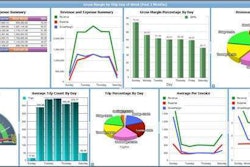
The American Trucking Associations on Tuesday, Feb. 14, filed a petition with the U.S. Circuit Court of Appeals for the District of Columbia asking the court to review the Federal Motor Carrier Safety Administration’s recently published final rule changing the hours-of-service regulations for commercial truck drivers.
“We regret that FMCSA and the Obama administration have put ATA and its member companies in a position to take this legal action,” said Bill Graves, ATA president and chief executive officer. “The rules that have been in place since 2004 have contributed to unprecedented improvement in highway safety. The law is clear about what steps FMCSA must undertake to change the rules, and we cannot allow this rulemaking, which was fueled by changed assumptions and analyses that do not meet the required legal standards, to remain unchallenged.”
While the final rule retains the current 11-hour daily driving limit – FMCSA previously was in favor of reducing it to 10 hours – it reduces by 12 hours the maximum number of hours a truck driver can work within a week. Under the old rule, truck drivers could work on average up to 82 hours within a seven-day period; the new HOS final rule limits a driver’s work week to 70 hours. FMCSA says it will continue to conduct data analysis and research to further examine any risks associated with the 11 hours of driving time.
In addition, truck drivers cannot drive after working eight hours without first taking a break of at least 30 minutes. Drivers can take the 30-minute break whenever they need rest during the eight-hour window.
The rule also requires truck drivers who maximize their weekly work hours to take at least two nights’ rest when their 24-hour body clock demands sleep the most – from 1 to 5 a.m. This rest requirement is part of the rule’s 34-hour restart provision that allows drivers to restart the clock on their work week by taking at least 34 consecutive hours off-duty. The final rule allows drivers to use the restart provision only once during a seven-day period.
Graves said ATA will continue to work with FMCSA to implement rules and programs that are based on sound research and will have a meaningful demonstrated impact on highway safety. “FMCSA’s own analyses show that even when they overstate the safety benefits of these changes, the costs created by their rule still outweigh those benefits,” he said. “We need this issue to be resolved in a credible manner, taking into account the undisputed crash reduction since 2004, so we can focus limited government and industry resources on safety initiatives that will have a far greater impact on highway safety.”
ATA said it will support FMCSA’s move toward mandated electronic onboard recorders to ensure greater compliance with current HOS rules and to facilitate better enforcement of those rules. “Improving highway and truck safety is about understanding the behaviors and events that precipitate crashes, and about implementing programs and countermeasures that truly address those causes,” said Dan England, ATA chairman and chairman of Salt Lake City-based C.R. England Inc. “We trust FMCSA will be a partner with ATA in implementing meaningful countermeasures aimed at the biggest causes of crashes.”











